Asparagus are an indispensable part of the German market. During the season, these vegetables are seen everywhere, as are they on the menus in the re staurants. White asparagus are the main part of this asparagus culture, but they are becoming less popular among the younger generations. Are green and colorful varieties the solution to bring young people to the asparagus? In an interview with FreshPlaza, Pieter Gabriëls, managing director of Bejo Samen GmbH, commented on the market, the variety novelties and well-tried varieties, as well as the leading position of the expoSE among the asparagus fairs.
staurants. White asparagus are the main part of this asparagus culture, but they are becoming less popular among the younger generations. Are green and colorful varieties the solution to bring young people to the asparagus? In an interview with FreshPlaza, Pieter Gabriëls, managing director of Bejo Samen GmbH, commented on the market, the variety novelties and well-tried varieties, as well as the leading position of the expoSE among the asparagus fairs.
"Germany is a very special market for asparagus, and the country is characterized by a high consumption - especially for white asparagus and the anthocyanin-free green asparagus. No other country is so enamoured by the white asparagus," says Gabriëls.
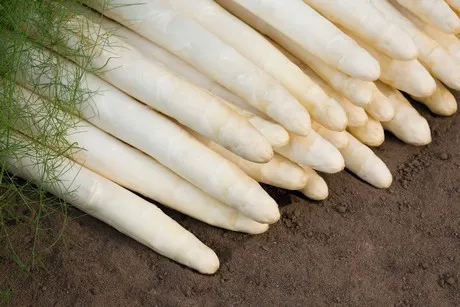
The Cumulus F1 is the most widespread variety in Germany. It is characterized by the extremely thin peel.
"This year, we presented two important new varieties, with which we hope to bring more variety to the German market, as the had experienced a certain supersaturation of white asparagus in recent years," says Gabriëls. "The Canticus F1 is a green asparagus that is suitable for cultivation in northern Europe, it is an early variety with a high yield.The peculiarity of this variety, compared to our green asparagus classic Bacchus F1, is that this species is anthocyanin-containing That is, the rods are not pure green, but have a slight reddish color and a very intense taste. "So far, one can find only anthocyanin-free asparagus from German producers: "Interestingly, however, the reddish coloration of imported goods is accepted among the customers, so we believe that the Canticus F1 will have a good chance in the future."
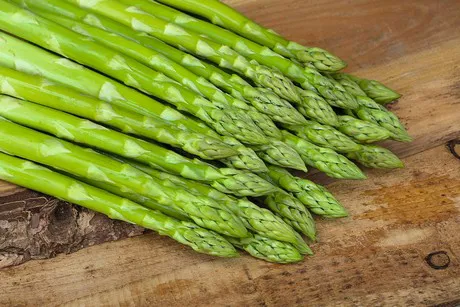
Above: The anthocyanin-free Bacchus F1, which is currently grown predominantly in Germany.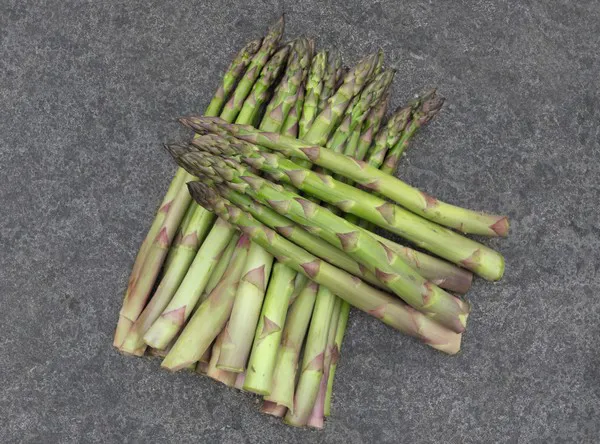
The new Bejo asparagus Canticus F1, with a slight red color.
Overall, the green asparagus so far only has a market share of about 7%, and rising. Gabriëls sees great potential, also for the novelty variety, which was presented correctly for the first time at this year's Fruit Logistica: "The Tricolore asparagus, as the name implies, is a tricolored asparagus. It is of the Cumulus F1variety, out most popular white variety, which has a very thin skin, is grown out like green asparagus, then cut into the ground a good 10 cm, so the lower part is white, the middle part is reddish, and the upper part green/red." In terms of taste, this Cumulus F1 has a very strong one, and the bleached part does not have to be peeled either. "This variant is ideal for grilling and roasting." Even with this concept, they are still waiting for them to be a "hit", says the expert: "Some producers have already tried the tricolor in small quantities, but we still have to wait a bit, until it has really established itself."
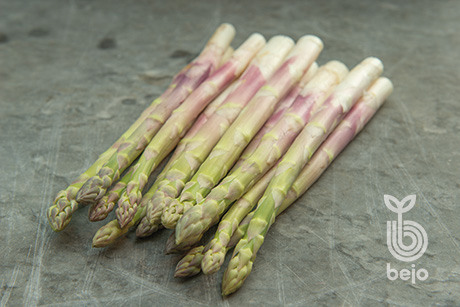
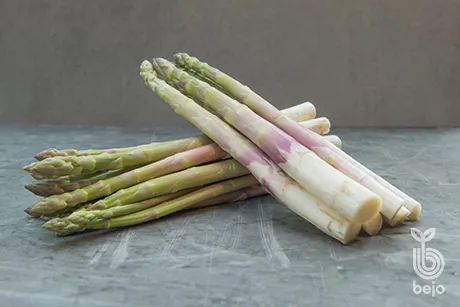
The TriColore asparagus.
A final feature in the variety selection is the violet Erasmus variety. "Here, the acreage is of course only a fraction of the green asparagus (less than 1% of the total acreage in Germany), but the positioning is interesting and the demand is quite large.We are trying to establish the purple asparagus as a salad asparagus, as this variety can even be eaten raw can and would be a nice addition to any salad as such."
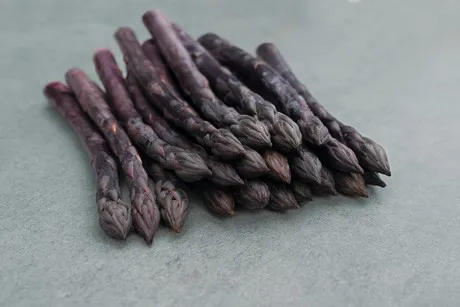
Violet asparagus: Erasmus F1.
With the colorful variety novelties, Bejo also wants to encourage the younger generations, who have a significantly different lifestyle, to eat asparagus. In order to make these varieties more well-known amongst the growers, the company will once again be present at the important asparagus fairs, especially expoSE: "We meet many German and international customers in Karlsruhe, which makes the fair so special It's the calm before the storm, because soon the new season starts again. "
Do you want to know more about the new varieties? Visit Bejo at the expoSE, on November 20th and 21st in Karlsruhe: Hall 1 - Stand D17.
For more information:Pieter Gabriëls
Bejo Samen GmbH
Danziger Straße 29
47665 Sonsbeck
T +49 2838 98989-0
E info@bejosamen.de
W www.bejosamen.de/
